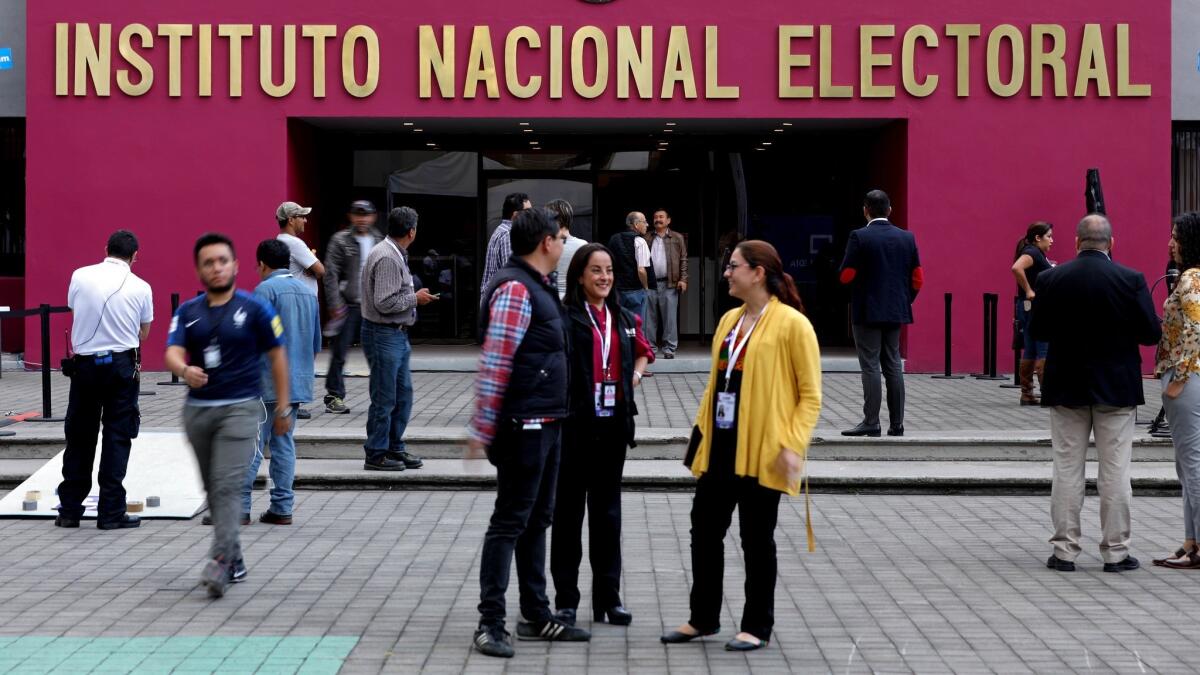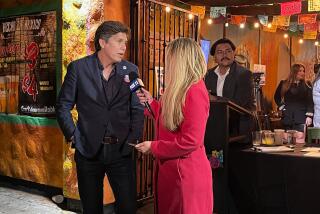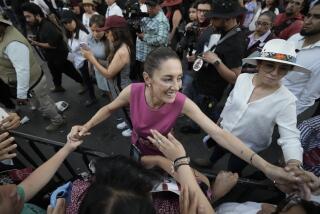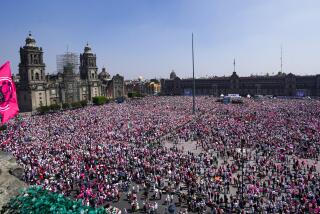On streets of Mexico City: Hope and fear on crucial election day

Mexicans were voting Sunday in national elections that could yield historic results.
Leading in pre-election polls was Andres Manuel Lopez Obrador, presidential candidate of the leftist National Regeneration Movement, known by its Spanish acronym as Morena. He is widely known as Amlo.
Trailing far behind in preelection surveys were two traditional-party candidates: Jose Antonio Meade of the Institutional Revolutionary Party, known as the PRI; and Ricardo Anaya of the center-right National Action Party, or the PAN.
Here’s what people on saying on the streets of Mexico City on election day.
The PRI loyalist
“I fulfilled my duty to God, and now I will fulfill my duty to the PRI,” said Oswaldo Romero, 74, who was leaving Sunday Mass and was headed to the booth to cast his ballot for Jose Antonio Meade, standard-bearer of the long-dominant PRI, or Institutional Revolutionary Party.
A PRI stalwart, Romero conceded that his favorite party—its reputation battered by corruption scandals, rising crime and a sluggish economy -- was not likely to fare well in Sunday’s balloting. But Romero vowed that the party, which dominated Mexican politics for much of the 20th century, would recuperate from its hard times.
“This is not the end of the PRI,” vowed Romero, who was voting in the mostly middle-class Vista Hermosa district in western Mexico City.
“In these elections it doesn’t look good for us,” Romero acknowledged. “The fault lies with the [PRI] governors who robbed so much, the corruption. The people will not forgive us for that. But the PRI has to learn its lesson and rally back. The PRI is the party of Mexico, it will make a comeback, I have no doubt.”
She’s with Amlo
“His ideology is all about helping people who have less,” said Judith Valdivieso, 40, who was among those voting in Mexico City’s southern Coyoacan district, with a mixed socio-economic population. “He wants to help others.”
Valdivieso is partially paralyzed and walks with a cane due to a neurological disorder. Lopez Obrador, she said, helped create social programs for the disabled during his tenure as mayor of Mexico City in the early 2000s.
Like many Mexicans, Valdivieso voices disappointment that the country’s leaders have not done more to spur the economy and reduce crime.
“We’re in a crisis,” Valdvieso said. “A crisis of violence and an economic crisis. People are fed up.”
Polanco likes Anaya
In the capital’s upscale Polanco district, it wasn’t hard to find supporters of Ricardo Anaya, candidate of the center-right National Action Party.
“I voted for Anaya because he appears to be cultured, intelligent, speaks very well and can represent us well abroad,” said Ana Maria Quevedo, 41, who owns a spa. “That is what this country needs: A president with presence, with innovative ideas, not a populist.”
Added Marco Dusche, 47, a businessman: “ I am confident that Anaya will win and this country will recover its route to economic growth. If Lopez Obrador wins, we are lost.”
They didn’t get to vote
Ana Yetzin Roman, 34, a teacher, said she had every intention of voting on Sunday. But at her assigned voting site in the violence-plagued Mexico City suburb of Ciudad Nezahualcoyotl, Roman said, a fight broke out between supporters of two leftist parties.
“Outside, people were approaching us and asking who we were voting for,” Roman said. “It was very intimidating, scary.”
So she left, along with other relatives, without having cast a ballot.
Tania Lorena, 29, faced a different electoral dilemma: She is from Morelos state but was working in Mexico City. Therefore, she had to vote at one of the “special” polling sites set up for people casting ballots outside of their designated home polling places.
“But every place I went there were no ballots,” Lorena said, recounting how she waited two hours at one special voting site. “I spent all the day trying to vote but there were no ballots. Finally, I just gave up. They tell us to vote, to exercise our rights, but at the time of the vote there aren’t enough ballots. It’s a joke!”
Mexican electoral officials acknowledged scattered violent incidents on election day and some shortages of ballots — especially at the special polling places set up for people voting outside of their home areas. But officials called the incidents minor and said voting proceeded across the nation largely without incident.
Linthicum is a Times staff writer and Sanchez is a special correspondent. Times’ Mexico City bureau chief Patrick J. McDonnell contributed to this report.
Twitter: @PmcdonnellLAT
More to Read
Start your day right
Sign up for Essential California for news, features and recommendations from the L.A. Times and beyond in your inbox six days a week.
You may occasionally receive promotional content from the Los Angeles Times.







